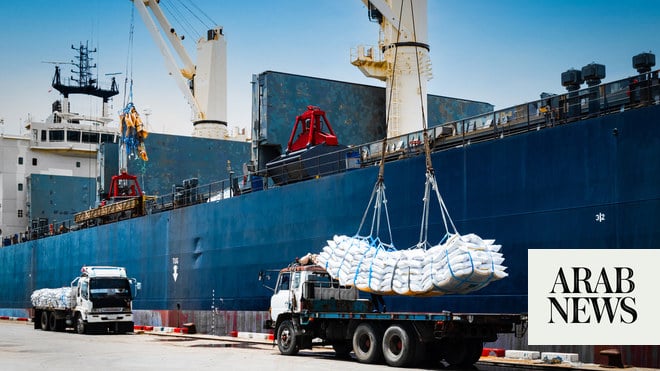Global food import costs to reach all-time high of nearly $2tn – Arab News
https://arab.news/g4e24
RIYADH: Food import costs globally are projected to reach an all-time high of nearly $2 trillion this year, the UN Food and Agriculture Organization (FAO) said in a report.
This is higher than previously expected as the new forecast of $1.94 trillion would represent a 10 percent increase over the record level of 2021.
However, the pace of increase is expected to slow down in response to higher food prices and the depreciation of currencies against the US dollar, according to the latest Food Outlook report.
Although prices have slightly dropped, the Russian-Ukrainian war continues to take a toll on the world’s food supply, as both countries accounted for 30 percent of all wheat exports, and other staple foods in the past.
Developing countries will make up for most of the global food import bill; however, poorer nations will still be highly affected, as their import volume is expected to shrink by 10 percent closing at the same bill because of inflationary pressures and accessibility issues, it added.
In addition, the report mentions that poorer economies will be forced to divert their imports to staple foods in comparison to their richer counterparts, who will continue to benefit from an entire range of food products.
The International Monetary Fund has intervened to curb the blow of soaring prices, where it approved a new shock window to compensate lower-income countries for the rise in prices.
FAO said it supported this decision deeming it essential to reduce the burden of import costs on poorer economies.
The report also drew attention to spending on imported agricultural inputs, where projections show a 50 percent surge to $424 billion of the global bill, fueled by increased costs of imported energy and fertilizers.
The Food Outlook report, which is published twice a year by the agency’s Markets and Trade Division, warns that existing differences are likely to become more pronounced.
“These are alarming signs from a food security perspective, indicating importers are finding it difficult to finance rising international costs, potentially heralding an end of their resilience to higher international prices,” noted FAO.
“Negative repercussions for global agricultural output and food security” are likely to extend into 2023, it added.
RIYADH: An international conservation group wants to help Saudi Arabia reach its goal of planting 450 million trees by 2030 to offset carbon emissions, its CEO has told Arab News.
Wildlife Alliance’s Suwanna Gauntlett also said that she wanted her organization to be on the ground training young Saudis to help realize the goal.
Speaking at the Saudi Green Initiative, which is taking place on the sidelines of the UN Climate Change Conference, Gauntlett said: “We are a non-governmental organization, nonprofit. Our mission is to conduct afforestation, where the forest has been denuded and to protect the forests that still exist.”
SGI plans to plant 450 million trees and rehabilitate eight million hectares of degraded land by 2030, which would cut around 200 million tons of carbon emissions a year.
“Our wish is to be selected to help them with the implementation and to accelerate (it) because there’s not much time left until 2030,” said Gauntlett.
Wildlife Alliance also aims to help with the country’s Vision 2030 mandate to designate as much as 30 percent of Saudi Arabia’s land and sea areas as protected as reserves.
The Kingdom currently has around 17 percent under protection, which include the Royal Natural Reserves, Natural Reserves and AlUla Natural Reserves.
“I’ve seen so far a great commitment from the Saudi government and the creation of the relevant departments to get the Saudi Green Initiative done. Centers, hiring managers, creating plans, and I believe now allocating budgets,” the Gauntlett told Arab News.
“We think that everybody should get involved. So, we’re specialists, we want to share our skills and our expertise and we want to do it now.”
Youth participation in the environmental sector is key to beating the climate crisis, she said.
“We have to let this new generation take charge of what we started. In my company, we now have one third of our 300 employees as youth just coming in,” she said.
The organization works on training those youths, motivating them, and giving the right framework, discipline, and professionalism that they need in order to get things done, Gauntlett added.
Wildlife Alliance is seeking to have its own pavilion and stage in next year’s 2023 United Nations Climate Change Conference, to allow them to hold conferences and presentations.
RIYADH: The Saudi Water and Electricity Regulatory Authority has introduced a regulatory framework for renewable energy systems for self-consumption.
This is a reflection of the energy sector’s efforts to develop regulations that align with and pave the way for the Kingdom’s Vision 2030 strategies and goals for the use of renewable energy.
Within an overarching vision striving towards net-zero, the initiative aligns with Saudi Vision 2030, which aims to reach the optimal energy mix for electricity production from renewable energy sources.
The framework for the self-consumption renewable energy systems was approved after the completion of the organizational and technical requirements by the concerned authorities were met.
The framework will enable consumers to install renewable energy systems for self-consumption, allowing them to utilize groundbreaking renewable energy technologies and provide a contribution to diversifying energy sources and helping Saudi Arabia achieve the optimal mix of electrical energy production.
Saudi Arabia is set to become the world’s biggest green energy producer, according to the chairman of ACWA Power.
Not only will the Kingdom be able to export green hydrogen to the rest of the world, it will also localize the whole value chain in the hopes of creating a real, proper, and sustainable economy that is capable of serving the country on a domestic level, Mohammed Abunayyan told Arab News last month.
In addition to being necessary for environmental reasons, the Kingdom’s renewable and energy transition also plays a role in the creation of more jobs and bolstering capacities and capabilities in line with the country’s industrialization goals, Abunayyan stressed.
Moreover, public-private partnerships are suitable when it comes to efforts to boost renewable energy since they are expected to help with innovation and finance structuring.
RIYADH: Saudi Arabia’s King Abdullah Petroleum Studies and Research Center has launched the second edition of the Circular Carbon Economy Index, a tool to compare how 64 countries are deploying various methods and technologies to reduce their CO2 emissions.
Launched during the UN Climate Change Conference, COP27, the CCE Index covers 90 percent of the global economy and carbon emissions, according to a statement.
The number of countries included in the Index has increased from 30 to 64, Fahad Alturki, vice president of Knowledge and Analysis at KAPSARC, said.
The newly launched CCE is based on four Rs namely, reducing, recycling, reusing, and removing.
“The CCE draws the attention to the need to manage energy and carbon flows holistically, each country and actor based on its strengths and priorities,” Alturki said.
In the 2022 edition, Norway, the Netherlands, Germany, the UK and Switzerland, top the CCE Index. At the bottom are five Sub-Saharan African countries.
The gap between these top and bottom performers is notable, which indicates that countries toward the end of the list in particular will be in need of significant assistance to be able to successfully transition to CCEs.
With regard to CCE Performance, many countries were found not yet deploying some of the most important technologies necessary for achieving full carbon circularity.
Compared with the CCE Index of last year, 57 countries improved their total CCE Index scores in 2022, while seven saw a deterioration in their scores.
For many countries, the most challenging task for a successful transition will be addressing the large gaps in enabling factors and conditions in areas like technology and access to sustainable finance, said Fatih Yilmaz, a fellow in the Climate and Sustainability Program at KAPSARC.
On Saturday, the Saudi Minister of Communications and Information Technology said the circular carbon economy is the only way to tackle climate change.
This came as Abdullah Alswaha outlined the Kingdom’s green initiatives during the UN Climate Change Conference, or COP 27, in Sharm El-Sheikh.
When it comes to the “remove” factor, he said Aramco, in collaboration with the Ministry of Energy, has launched a carbon capture and storage hub with a storage capacity of up to nine million tons of carbon dioxide per year.
With adequate talent and technology, the minister stressed Aramco has demonstrated that carbon can coexist within the transition to net zero underground.
RIYADH: Saudi Arabia’s main index ended the first session of the week positively, following the Kingdom’s green initiatives in Sharm El-Sheikh last week.
The Tadawul All Share Index was up 0.31 percent at 11,246, while the Nomu parallel market saw a 0.61 percent rise at 19,024.
Tadawul Group fell 9.92 percent, after the completion of the Public Investment Fund’s sale of 10 percent of its shares in the group at a price of SR191 ($51) per share, making it the top faller.
The Kingdom’s largest lender Saudi National Bank gained 2.91 percent, while Al Rajhi Bank, the state’s most valued bank declined 0.12 percent.
Saudi oil giant Aramco, the biggest oil producer in the world, gained 0.58 percent, while Rabigh Refining and Petrochemical Co. also increased by 1.45 percent.
Saudi British Bank was down 1.19 percent; similarly, Alinma Bank saw a 0.39 percent fall.
Al Moammar Information Systems Co. gained 2.80 percent, after it renewed its Shariah-compliant facility worth SR150 million with Gulf International Bank.
Aljouf Mineral Water Bottling Co. got the approval for increasing its capital by 50 percent to SR47 million after the Capital Market Authority’s nod, and as a result, saw a gain of 1.04 percent.
Among the top gainers, Saudi Arabian Amiantit climbed 9.89 percent, and Etihad Atheeb Telecom ended the session up 9.88 percent.
RIYADH: Shares in Saudi Tadawul Group Holding Co., the owner of the Kingdom’s bourse, declined almost 10 percent, after the final offer price for the sale of a 10 percent stake in the company was set at SR191 ($51) per share.
The stock market operator saw its share price reach SR188.80 at the end of Sunday’s trading session, against a share price of SR209.60 at the end of the previous session.
The PIF, which has over $600 billion in assets, offered 12 million shares in Tadawul Group, according to a bourse filing.
The offering is in line with the PIF’s strategy of recycling its capital in order to invest in emerging and promising sectors of the local economy.
Last year, the PIF sold a 30 percent stake in Tadawul in a $1 billion initial public offering, doubling its share value.










